|
St. Elizabeth of Hungary Catholic Church has received a Hope in Action award by Kentucky Interfaith Power and Light. For details, see here: www.kentuckyipl.org
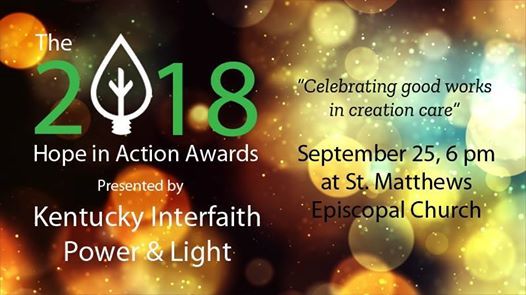

Earth's shadow, visible on crescent moon.
(*photo credit)
December 1, 2018 Climate Change Can Still Be Halted
The annual international meeting taking among nations on the critical issue of climate change makes us all pause and ask the question: Are we going to be able through voluntary cooperative efforts to halt the catastrophe that is emerging at this time. Glaciers are melting; oceans are rising; more frequent violent storms and floods are experienced; flora and fauna are under severe impact; mishaps abound that can be associated with the warming planet. These alerts are being verified by astute observers throughout the Earth along with the near unanimity of the world's climate change scientists. Powerful climate change deniers support their position by prolonging a profitable fossil fuel economy.
Oxfam International says that small farmers around the world are already suffering. Growing seasons appear to have shrunk in number and variety; rainfall is more unpredictable, tending often to be shorter in duration in some places and longer to the point of flooding in others. Winds and storms are felt to have increased in strength; and unseasonable events such as storms, dense fogs and heavier rains are more common. Oxfam concludes that climate related hunger may become the defining tragedy of this century,
A decade ago the Global Humanitarian Forum estimated that climate change was already responsible for 300,000 deaths each year, and this will rise to a half million each year by 2030 -- and the statistics are still on track. If climate change is not brought under control, 310 million more people will suffer adverse health effects by 2050; and economic costs due to these conditions will rise from $125 billion today (more than all humanitarian aid to developing nations) to $600 billion a year by 2050.
With such dire predictions often voiced in this century, why are we going so slowly? The Trump administration has attempted to take the U.S. out of the discussion except to promote clean coal and nuclear power, both completely outmoded and on the way out. Retarding the oncoming renewable energy economy at a time when all reductions of carbon dioxide emissions are salutary verges on the demonic. The bankruptcy of Big Energy corporations is being delayed at the expense of the poor and weak throughout the planet. Cooperative regulation within the global community of nations is paramount -- if only the governments take such bold steps.
Since the turn of the century developing nations such as China, India, and Brazil have overtaken and surpassed the developed world as emissions leaders. Poorer nations call for funds to help tide them through conservation measures needed to meet their share. India does not want to reduce its own emissions until it is equal on a per capita level with those of the West (that means doubling current Indian emissions via in part by increased use of coal for powerplant fuel). Without regulations will we experience mutually assisted suicide as cautioned by Pope Francis?
Prayer: Lord, awaken us to consequences of current actions.

Wintery cloud patterns take shape over the Bluegrass region of Kentucky.
(*photo credit)
December 2, 2018 Advent: Turning Reflection into Action
There will be signs in the sun, the moon and the stars, and on Earth nations will be in dismay, perplexed by the roaring of the sea and the waves. (Luke 21:25-26)
We come to the new Church year, and the start of the season of Advent. The readings set a sobering mood and allow us to ask basic questions as to whether we are near the end of times. Of course the answer is "yes;" if the time from the Big Bang would be regarded as a day, then time from the birth of Christ is two seconds. Yes, these are the end of the ages and we are called to be participants. But what are characteristics of our time of waiting for the end. Let's reflect on a few:
Keep priorities in mind -- We have the Lord as a companion, and so our confidence should give a sense of spiritual power with whatever comes. As participants we must do something to hasten the day of the coming of the Lord. We do not sit back and rest on pretended laurels; we must participate in some way.
Keep awake -- Watchfulness is not really something seasonal but rather the hallmark of every Christian's entire faithful life. This is far more than Jesus-and-I apart from our troubled neighbors in a threatened global neighborhood.
Keep listening -- The Lord is speaking to each of us and to the entire Church community of faith. This means we must take quiet time to stop and listen for what God is saying to us. Listening is really an art of giving time and cutting away the allurements that constantly crowd upon us. Turn off the electronic device for a brief period and allow yourself to listen and hear the divine call -- and to discern how it applies in your life.
Keep connected -- The spirit of being watchful and vigilant must be cultivated. The best way to do this is to acknowledge our need for assistance; we are plagued by a flood of information, some fake, so inadvertently false, some of pure gossip and meaningless, and some of more sophisticated allurements that can easily entice us. Nearness to the Lord demands prayer and continued connection similar to addicted electronic device users who walk, sit, drive and eat with the device before their eyes. In much the same way we are called to companionship with the Lord. And the sacraments give us the nourishment needed to keep spiritually connected.
Keep spreading the word -- Many feel the seriousness of these troubling times and feel helpless to make any difference. In reality, they are able to be spiritually powerful and able to help make profound changes. Convincing them of this is spreading the Good News. Regard this as also involving an eagerness to hear this message, if we are willing to speak a word of encouragement.
Prayer: Lord, allow us during this holy season to realize our own God-given power to make change and to tell others about it.

Snow and ice on rural Anderson Co., Kentucky stream.
(*photo credit)
December 3, 2018 Participate in Eco-Walk Programs
Walking seems to be a lost art for many who would rather get in a car and drive to get some milk or a paper. A few years ago Mazda Motors, the Japanese automaker, encouraged its thousands of employees to walk to work in order to improve workers' health and to cut back on air pollution. Those who walked more than four kilometers on a round trip on a regular basis (at least 15 days a month) received the equivalent of $12 per month. Some workers left a bus or train early and walked the rest of the way on foot, so that they could reach the acceptable total distance. Mazda is not alone; a year before, Yamaha, the motorcycle maker started a similar eco-walk.
Obesity, commuter congestion, air pollution, and carbon footprints are all reasons for considering eco-walks as sound policy. However, these exercises should not be done only on a random or occasional basis. They should be regularly used by those able to walk. Nevertheless, walking to work or for physical exercise requires safe walkways that are not always accessible to people in our urbanized and overly congested world.
All too often parents seek to be good to their charges and so take them to the school door with no chance for the youngster to have any extra exercise. The cars move ahead one car length at a time. Each child performs the least amount of exercise in moving from vehicle to school door. Later, after school with its similar door-to-door pick-ups and drop-offs, some of the more dutiful parents drive their kids to an exercise place so as to prevent the youngster from becoming a complete couch potato. It's a far cry from when we'd decide to walk home from school for several miles rather than take the bus.
Walking benefits go beyond fuel economy and physical exercise:
* Walking allows us to look out and see the countryside, and get a feeling for the environment in which we walk; that gives us a different perspective from that obtained in an auto ride, and allows us to consider ourselves as part of the natural world.
* Walking gives us precious time to be alone and to pray and reflect on what will occur that day or the following weekend; that requires a note to emphasize to vehicle electronic device users or tempted users: it is good to have free time.
* Walking becomes an example for others to follow; many passing drivers will say to themselves, "I really should be doing the same thing for my health and well being."
* Finally, walking is a public act of commitment to saving Earth's limited resources by an immediately observed green action.
Prayer: Lord, You walked together with our ancestors on their journey of faith. Teach us to see benefits in walking with You.

Bringing home a freshly-harvested cedar for the holidays.
(*photo credit)
December 4, 2018 Consider Insulated Window Shades
Some of us put plastic on doors or windows that need more adequate insulation during the winter season. However, there are more permanent devices that, once installed, do not have to be put on and taken off with each heating season. One such permanent conservation measure that combines good ecological practice with craft and art is an insulated window shade. This device comes in a variety of designs and can be effective, economical, and attractive for solving both winter's cold and summer's heat problems. Around one-quarter of the winter domestic heat or summer cool air loss may occur from uninsulated windows through four different ways: infiltration in gaps in the window, conduction, convection, or radiation.
Infiltration can be blocked by caulking, weatherstripping, storm windows, or a layer of plastic over the window. However, the window shades can also do a very effective job in stopping energy loss. Conduction is averted by forming a blockade of insulation and then trapping the air. Convection is blocked by the sealing of the edges so that air currents cannot develop. Radiation is reversed with inclusion of a reflective surface, which has a similar effect as aluminum foil reflecting the sun's rays.
To make an effective insulating shade one needs one or more layers of insulating (air-trapping) fabric (e.g., batting), a reflective surface (e.g., Astrolon), a vapor barrier (e.g., plastic), and some way of sealing the shade on all sides. These shades are more effective, if carefully constructed using good insulating materials and fitted tightly to the frame of the window. This tight fitting may be performed either by the use of Velcro on the edges of the shade and frame or by a wood frame shutter that closes after the shade is lowered. A roller and a Roman shade can be modified into a quilted roller shade made with layers of insulating materials, and covered on the inside with a quilted mat with Appalachian quilt designs.
For effective results in winter, the shade is raised in daytime to allow maximum solar gain and sealed or pulled down in the evening for maximum insulation. In summer, the shade can be lowered in daytime to serve as a sun block, or kept lowered in order to conserve cooled air within the room. Making window shades is one way less mobile people with sewing skills can be effective energy conservationists. The product of their hands can be appreciated as a work of art even well after they have passed on.
ASPI has had some examples of insulated window shades and one such can be seen in the Mary E. Fritsch Nature Center. This set is fashioned with Velcro strips to hold the shade tight to the window frame. For more information see "Healing Appalachia: Sustainable Living through Appropriate Technology," p. 236-37.
Prayer: Lord, help us see that domestic conservation work can be artistic, exciting, economical, effective and permanent.

Decaying log creates new habitat for plant seedlings.
(*photo credit)
December 5, 2018 ARE the United States Unique?
Before the Civil War citizens said, "the United States are." Afterwards "is" meant our single nation. However, each state has unique cultural and descriptive adjectives possibly such as --
Alabama -- most...folksy Montana ...vast, expansive
Alaska ...unconquered Nebraska ...orderly
Arkansas ...folksy Nevada ...chancy, risky
Arizona ...serene New Hampshire ...patriotic
California ...golden New Jersey ...ethnically diverse
Colorado ...majestic New Mexico ...enchanting
Connecticut ...energetic New York ...literary, cultural
Delaware ...the first North Carolina ...diverse
Florida ...sunny, fun-filled North Dakota ...rural
Georgia ...noted for foods Ohio ...conventional
Hawaii ...sought for tourism Oklahoma ...witty, native
Idaho ...beautiful Oregon ...ecological
Illinois ...productive Pennsylvania ...tidy, Amish
Indiana ...Typically American Rhode Island ...maritime
Iowa ... symmetrical South Carolina ...independent
Kansas ...bountiful South Dakota ...surprising
Kentucky ...hospitable Tennessee ...colorful
Louisiana ...easy-going Texas ...inviting, social
Maine ...brisk, refreshing Utah ...rugged
Maryland ... with it Vermont ...scenic
Massachusetts ...academic Virginia ...presidential
Michigan ...delightful Washington ...athletic
Minnesota ...lake-filled West Virginia ...helpful
Mississippi ...generous Wisconsin ...tasteful
Missouri ...down-to-earth Wyoming ...memorable
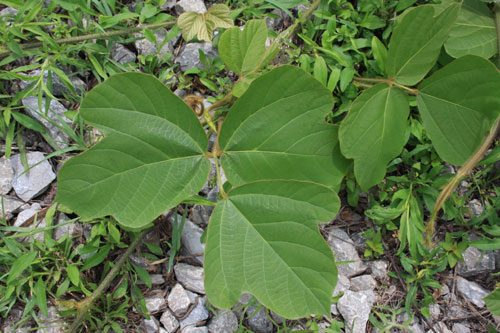
Abundant leaves of kudzu on southern Kentucky hillside.
(*photo credit)
December 6, 2018 Strive to Control Kudzu
Kudzu does not conjure up pleasant memories in the southeastern United States; however, in Japan, the country of origin, the plant is regarded with respect. Why the difference? The Japanese regard this as a native species that when properly controlled has many good uses as food, animal feed and fiber. However, in the U.S. the introduction and cultivation was terribly mishandled -- and kudzu has gone wild. All parties agree that kudzu has many good properties that led to its U.S. entry: its easy adaptation, versatile growing conditions, and vegetative proliferation as potential livestock feed. However, traditional Japanese control and cultivation were foreign to Americans.
Kudzu (Pueraria lobata) arrived in our Southland from Japan at the New Orleans Exposition in 1884; it was seen as an exotic ornamental with sweet smelling flowers and lush foliage. By the turn of the 20th century, a southern agricultural association was promoting it as a fodder for cattle. In 1927, a Georgia promoter declared, "Cotton isn't king here anymore; kudzu is king." By 1934 the U.S Soil Conservation Service had introduced this plant as a species for use in eroded ravines and for reclaiming road and railroad cuts. About that time academic research at the University of Georgia found hormones to make kudzu grow faster. After the Second World War, the truth began to dawn: kudzu was an uncontrolled menace, growing rapidly beyond intended areas, climbing over buildings and large trees. This exotic species was an invasive. By 1993 the cost of fighting kudzu was estimated at $50 million annually. (Reference: Kurt E. Kinbacher, "The Tangled Story of Kudzu," in Auburn University's The Vulcan Historical Review, Volume 4, Spring, 2000.) Now it is double that amount.
Granted kudzu has benefits. It has a potential to support bioremediation efforts to regenerate the fertility of nutrient-depleted soils. As a legume it has a symbiotic relationship with Rhizobium and can fix nitrogen in soils. Besides, kudzu is a green manure, will out-compete weeds, returns nutrients and biomass to soil, and makes a fine mulch and an animal fodder comparable nutritionally to clover and alfalfa; the plant is rich in vitamins, calcium and protein.
The uncontrolled proliferation of kudzu was only gradually recognized and America's first revegetation efforts became a miserable failure. As a postscript, kudzu is now an invasive exotic species choking out native species throughout the Southeast. It covers over 7,000,000 acres of land, or equivalent to that of Maryland. Some eradicate the pest using chemical herbicides. Newt Hardie of Spartanburg, South Carolina uses volunteers to spread sheets of thick clear plastic as a defoliant, and then attacks the root crowns with pruning saws and hand plows, an elaborate process.
Prayer: Lord, teach us to be responsible in introducing exotic species, to test them before widespread introduction, and to respect the native species with which they will coexist.
Silence about Inequality Is a "Sort of Blackmail"
It appears at first to be a great mystery: why don't moral leaders speak against the vast wealth of a few coupled with the destitution of the many? Why the silence? The puzzle evaporates when we face reality. Some of the wealthy are friendly enough to support our particular causes. Silence comes with fear of losing donations? Too many who beg for support will not bite the hand that feeds them; to critique inequality in this age is quite biting to a rich person. Do receivers of largess in this and other lands accept being tempted never to complain about the so-called legal conditions in which rich friends have acquired their status? Good and successful leaders beg, while silent about deeper economic issues near at home.
Is it charity? Distributing from our abundance is a major topic for all types of non-profits including religious ones. There is even more to the complex exercise of easing money from the wealthy. Many call it "charity" when it is really a means to avoid tax collectors or possible government regulations to limit the continued favoritism to the wealthy. Instead of a prophetic warning, rich donors receive praise from willing sycophants. On the other hand authentic prophets risk starving for lack of funding. One alternative for the prophetic is to require the least financial resources possible to achieve their chosen missions.
Change the rich? Some well-intentioned moral leaders seek reform among the wealthy -- as though this will change the entire privileged class. At least they seek to correct the business practices of a certain portion with hopes of making them models of reform. These moral leaders accept the wealthy argument that the rich know best how to distribute their largess -- and rank and file are programmed to simply say "thank you." Furthermore, in an age of crass materialism to expect more than a very few rich folks to voluntarily surrender to a lower economic state is unrealistic; most will not do it. What many of the rich would prefer is to publicize giving some of their vast wealth to their selected good causes (a power play) and thus convince moral leaders to be advocates of the continued "morally responsible" status quo.
Limits to wealth. On the other hand, authentic prophets who strive to change governmental attitudes will focus on questioning existing practices (tax codes, favorable regulations, etc.), though realizing that changes in the tax base are highly unpopular with many current legislators. Add to this the heavy pressure to leave inequality (by the modern merchants of doubt) in place and in the hands of high-paid lobbyists.
Change is a most difficult task, but in this globalized age must include government-induced limits to wealth lest our very democracy become threatened. One of our insightful American founders, Ben Franklin, was wise far ahead of his times. State and national landholders both at the Pennsylvania state constitutional convention and the U.S. one later were convinced he was senile; he was a lone voice for limits to wealth. We ask today whether billionaires continue to gain power -- and erode still our democratic process? Where are the political parties?
Redistribution. Inequality damages democracy and so some form of redistribution is necessary, provided it is not violent. It also make economic sense, for redistributing wealth leads to greater purchase power by lower income people and ultimately an expanded economy and more meaningful employment. People who have basic essentials will have leisure time to advance hopefully in happiness and spiritual life; improved health access would benefit all who are bankrupted by hospital bills and overwhelmed by expensive medicine. Furthermore, moderated wealthy individuals will have a better chance for eternal salvation. All parties benefit from a radical redistribution.
Power of contributions. Continued amassing of private wealth in our nation must be challenged by the people who deserved access to government as part of their citizen rights. The privileged few should not have greater influence by a Citizen's United mentality in unlimited use of funding for policy-making. Currently, rich individuals through corporations can buy candidates and elections; they overlook or seek to privatize starved critical infrastructure systems; and they forget about immense growth in national indebtedness on future generations by their low taxes. If moral leaders remain silent through their dutiful paybacks, how can those with even less power be heard in a cacophony of modern commercial noise? One challenge to wealthy political power may be large numbers of small contributions, for it does take funds to bring about political changes.
Simple living. One long-term answer is to counter wealth with people power from those willing to live simply and require lower operational expenses. Live like the lower income citizens. Believers in the future strive to attain distance from materialism and its violence. Simplicity in life is the atmosphere in which such essential changes must and will occur. Simple living leaders are then unbeholden to wealth to keep operating. That divorce from wealth has many advantages; it frees one from an affluent mentality; it gives special attention and a preferable option for the poor; and it challenges the wealthy message that they know best with their use of money. The liberated simple leader can afford to speak out against inequality, but the challenge is to build a small or medium donor power base; some money is always needed to fund basic costs of staff and expenses, a necessity that cannot be fully eliminated in any non-profit organization. Think simplicity.
Freedom or/and equality. In reading our Declaration of Independence there could develop a struggle over the concepts of freedom and equality; they certainly have been different foci at particular historic periods. Too often rights of those seeking a more expanded freedom (an issue in racial, sexual, minority, migrant and other rights) takes precedence over equality matters. However, the equality focus becomes necessary in the climate change battle, because the super-rich are the primary deniers of the current situation -- and are spending heavily in America to avoid the current global struggle. Setting priorities straight is most difficult, especially with an unwillingness to overcome privileged propaganda clamoring for less government. We must reaffirm that governmental participation is crucial in moving to greater equality and to solving today's economic problems.
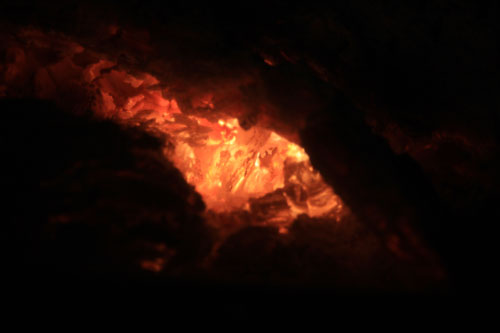
Glowing embers in wood-burning stove.
(*photo credit)
December 7, 2018 Ensure Domestic Fire Safety
Fire Safety Day allows us to recheck on everything so that our upcoming holidays will be safe and more joyous ones. We know that before this month ends some tragic accident will be reported in the news involving unsuspecting merrymakers. Well in advance of the celebrations let's ask ourselves some basic questions, so that dangers can be uncovered and fixed before guests arrive:
* General interior safety -- Do you have an early warning system in place in case of fire -- alarms with active batteries, numbers to call, serviceable fire extinguishers? Is there a fire screen when an open fireplace is used for cozy fires this winter?
* General exterior safety -- Have the chimney and flues been checked this year? Do you compost and refrain from burning garden or home-generated wastes that can be recycled in other ways? Is the house equipped with lightning rods? Is there cleared space from which combustible brush and thatch have been removed? What about leaves in the hidden places of the yard?
* Home decorations -- Do you decorate with materials that are not easily combustible? Is there a fire safety consideration in selection of ornamentals? Are exterior strings of lights properly hooked to the system?
* Festive practices -- Are all lit candles attended to at all times? Do you refrain from lighting candles on Christmas trees or near potentially flammable evergreen decorations? Do you omit the use of fireworks in the home environment -- and leave that to the officials who are trained for such displays?
* Home safety regulations -- Do you forbid smoking of tobacco or marijuana on the premises, and realize that cigarette paper is made to burn well, something like a dynamite fuse? Do you have exit routes thought out in advance, and are all residents aware of how to open windows and exit the building?
* Internal safety measures -- Is access to matches difficult if infants are around? Do any of the appliances malfunction or spark when used? Are any of the circuits overloaded? Have electric safety plugs been installed, especially near water sources in bath room and kitchen?
* Kitchen safety -- Are you aware that many house fires relate to cooking? Is combustible oil handled properly near hot surfaces?
Are paper towels kept at a distance from hot surfaces? Do you have sufficient heat pads and gloves? Is a properly serviced fire extinguisher in easy access within the kitchen area?
Prayer: Lord, You gave us fire to keep us warm and to cook our food. Allow us to foster a sense of care for safety of all residents and visitors, and to treat our gift of fire with respect.

Pennywort, Obolaria virginiaca, blooming in mild December.
(*photo credit)
December 8, 2018 Proclaim Mary -- Mother of Earth
He went in and said to her, "Rejoice, so highly favored!
The Lord is with you." (Luke 1:28)
If fragile Earth is dear to us, we must show devotion by protecting her. If one must be humble when close to humus Earth, so those who are most humble are the ones more down-to-Earth. If we are all blessed by being close to Earth, she who mothered the One coming down to Earth, nurtures and "mothers" Earth herself. Why set Mary on a pedestal, for her role is one of service on this Earth -- and she needs to be close to us?
From the beginning of creation Mary was special in the mind of God; throughout the long course of salvation history Mary had a preparatory role, which she discovered as a young lady of her culture, which included the longing of Chosen People for the Messiah's coming. Furthermore, she was down-to-earth in her manner of life: her counter response to Eve's "no" to God's command to abstain from the Tree of the Knowledge of Good and Evil (Genesis 3); her helping to create a new Garden of Eden by a "yes," Let it be done according to God's wish; her deep reflecting on things in her heart; her allowing her son to leave home on his mission; her times of happiness, sorrow, apprehension and joy; her standing at the foot of the cross; and her presence at Pentecost. Because she is willing to trust even though she does not fully understand, she is truly the mother of all the living and of all people of hope. She is filled with the Holy Spirit, who inspires and remains with her. She is taken into heaven ahead of us.
If Mary finds favor with God, so should we who seek to be in divine favor. By assisting in protecting Earth we also bring salvation to it -- just as by her "fiat" Mary did two millennia ago. As members of the divine family through baptism, we participate in healing Earth with Mary even though she has been very highly favored:
* We were in the minds of God from all eternity;
* We bear the traces of the faith of our ancestors who lived, hoped and trusted in God to keep offspring in the faith;
* We were immaculately conceived into the Body of Christ at baptism -- though we do not remain so due to our imperfections;
* We await the coming of the Lord into our lives as Jesus comes to each of us in the sacraments;
* We bear Christ to others as part of our mission in life amid joy, sorrow and troubles;
* We take risks and trust God's grace on our journey of faith; * We are thrust into the cosmic struggle of good and evil;
* and we beg for the transparency of Mary to look ahead to a New Heaven and New Earth.
Prayer: Lord help us to see that just as Mary is totally open and transparent in her radiant being, so we need to see our mission to enter with her into the role of healing our wounded Earth.
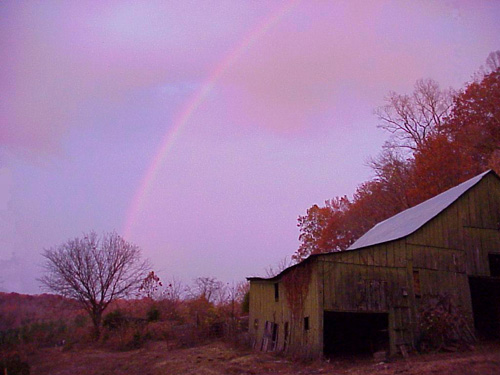
Rainbow over Estill Co., KY barn.
(*photo by Sally Ramsdell)
December 9, 2018 Prepare the Way of the Lord
Advent is the season in which we join in preparing the way for the Lord to come into a troubled world. We are bridge builders, those who take from both the old and new in order to serve others. We are called to help straighten the spiritual and social conditions on all levels of community and citizen action. John the Baptist, a truly simple living person, was most forthright and open about what needed to be done in his day. We are called to show the same determination in addressing the addictions and allurements of our people to drugs and consumer products.
Individually, we must discipline our lives, much as did the simple prophet John the Baptist. We find Advent as well as Lent to be periods to control our appetites and build our resistance to the world's allurements. The Lord wants us to be able to say "yes" to God, and to say "no" to such distractions as drugs and consumer luxuries. Such straight talk is achieved through self-control and self-sacrifice. Certainly our culture hardly believes in sack cloth and ashes, but it ought to look behind symbols to giving up excesses. Instead of expensive wardrobes and gifts expected for Christmas, we ought to prepare ourselves through fasting and self-denial, through living more simply, and through encouraging others to do the same.
Regionally, we must confront the problems facing our communities, whether these be heavy drug use, lack of employment opportunities, or destruction of our environment through overuse of resources in our individual and collective lives. People feel disconnected, and they need to regain a sense of community through joint activities and programs to enhance their family's well-being.
Nationally, we need fiscal responsibility as well as proper caring for the health of all the people. As mentioned on December 2, we must address the cultural expectations of an economy based on consumption of goods, and transform that into one of a service economy, serving the needs of everyone not just the top 1%. We must encourage fair taxes and accept strict regulation of the greedy moneychangers in our Wall Street temples.
Internationally, the world's people must begin to feed the food insecure population. Most problems facing our world would be addressed, if those who are privileged were to contribute to the hungry. We learn from John the Baptist's proclamations that straightening out the crooked ways is a public act, something in which we all participate. John and later Jesus had courage to face immense hostility. Why in this upcoming season of peace, tranquility, and friendliness bring up such pressing problems as individual restraint, regional awakening to drugs, caring for resources and assaulting ongoing privilege? The reason is that preparing the way means helping to establish justice for all.
Prayer: Lord, You prepared a people for the Messiah's coming; help us be co-preparers of the New Heaven and new Earth.

Patterns in opened walnut shell.
(*photo credit)
December 10, 2018 Participate in Human Rights Day
The Highest office in a democracy is the office of citizen. -- Supreme Court Associate Justice Frankfurter
On Human Rights Day we manifest our citizen participation at various levels. A first level is becoming aware that wrongdoing has occurred, and that this requires initiation of the process of forgiveness. Our nation often winks at global human rights violations "for the greater good" and to further the good will of commercial partners. When being combatants in war, how can we as a people ignore the demands of the Geneva Treaty for proper treatment of war prisoners? In past times of lapses, such as the internment of Japanese Americans in the Second World War, actions were recognized as temporary and needing some form of compensation for victims. We cannot excuse our past failures such as the Alien and Sedition Act of the 1790s, and yet in troubled times we must act justly and speak out for distant human rights abuse. Current unjust conditions cannot be dismissed as beyond our immediate concern. Reconciliation needs to occur, not between culprit and observers, but between culprit and victim. It is in our national interest that acts of injustice be exposed and denounced.
A second level is recognizing that distance hinders full reconciliation. Standing apart from the culprit and victim is part of the problem. Therefore we close the distance and halt the wrongdoing to the degree that we can; we call to the victim to begin the forgiving process. Our own reluctance to become party is part of the dysfunction resulting from the cumulative social effects of wrongdoing. The human family has been hurt, and we strive to move to change. Mere awareness and denunciation is not enough. We must be courageous to enter the conflict in some way.
The third and deepest level is to become at-one with the other parties in creating a better future. Forgiveness does not overlook the wrongful action and thereby, implicitly, condone the wrongdoing that has occurred. "We forgive" means a forming of community among all (observers, victims and culprits). All are hurt; all need reconciliation as friends. If the person who is doing a wrongful action or omitting doing a rightful duty is a relative, acquaintance or collaborator, it is obvious why we should act -- but all are neighbors and part of the global family.
America is a home of the free and the brave and our record must be consistent for all people. Other governments may be angered by our focusing on their human rights violations, but we must be true to our constitutional guarantees and defense of freedom. When injustice is near at hand, we must bring peace; if it is at a distance we as citizens of a democracy must apply pressure on elected representatives to speak out and bring change.
Prayer: Lord, teach us to speak up for the rights of individuals and never to let the risk of economic or political considerations hold us back as a nation.

Rural road meets Franklin Co., KY sprawl.
(*photo credit)
December 11, 2018 Confront Urban Sprawl
Several times a month I drive through urbanized Madison County, Kentucky, on the way to Lexington. This county, including the towns of Richmond and Berea along with Eastern State University, is growing in population and congestion. Literally dozens of acres of formerly highly productive farmland are being scraped and bulldozed into new housing, commercial establishments, and suburban roadways. For idyllic landscape lovers, it is not a pretty sight. Some of us may remember pictures of or actual visits to European cities with neat divisions made between what is urban and what is rural. With proper planning and building regulations, much of Europe lacks the sprawl found here in Madison County and elsewhere in America. In fact, some speak of urban sprawl as threatening some of America's prime farmland.
American urban sprawl is due to use of private automobiles and relatively cheap fuel for commuting, to the status of owning greenspace, to the desire to escape congestion, and to the quest for open space and fresh air. Other factors include the unfettered activity of real estate developers and the lack of zoning and land use regulations. Kentucky hurts, for it loses over one hundred acres of farmland each day. Because of its relatively small size -- Kentucky is thirty-fifth in area -- the state is heavily impacted from this undirected sprawling of city into countryside. In Mason County, Kentucky, where I was born, the once beautiful rural countryside near my homeplace is now dotted with scattered housing -- and that in areas containing modest farms in the 1940s. However, it is comforting to see that some very marginal farmland is being utilized by establishments bordering the recent, limited access AA Highway, running through that familiar countryside of my younger years. Change occurs and we do little about it.
Sprawl not only pollutes the scenic view but consumes prime farmland, but some of which can still be used as backyard gardens. One map by the American Farmland Trust shows large patches of the United States with prime farmland and heavy development. In fact, if the trend continues in our Bluegrass State, the tourist attraction of landscape charm will be lost along with its associated business. Traditional farming ultimately loses in the development battle. Leapfrogging (creating idle land between new developments) isolates traditional rural communities, raises land prices, results in trespassing on land and crop damage, and creates opposition to farm practices (e.g., spreading manure on fields).
Sprawl can be checked through proper types of zoning and land use regulations, which gain favor as citizens see the need to retain open undeveloped space. Proper planning preserves the character of the landscape -- but it takes community effort to achieve modest results. A desire to cut commuting time has made a return to central city urban living an attractive alternative.
Prayer: Lord, teach us to respect our land and to see beauty in proper planning and use of our precious greenspace.

Raccoon tracks on freshly-fallen snow.
(*photo credit)
December 12, 2018 Celebrate Our Lady of Guadalupe
Our Lady of Guadalupe is dear to the hearts of many Mexicans and also Mexican-Americans and other Hispanics in this country. The origin of the feast is a fourfold appearance of the Blessed Virgin Mary to St. Juan Diego on December 9, 10, 11, and 12, 1531. This occurred on Tepeyac Hill outside of Mexico City. Her appearance on the cloak of Juan was of a young woman of color, and assured the defeated Aztec Native Americans that the faith was not only that of the Spanish conquerors, but of them as well. Mary was and is compassionate towards all; this fact was received in open arms by not only the Mexican people but those of all in Central and South America. In 1910 this day Mary was declared "Queen of Mexico" and "Empress of the Americas" -- nobility within democracy.
In my thousands of Daily Reflections I have neglected this rather prominent feast day. In fact, back in 1969 while in post-doctorate work at the University of Texas three of us Jesuits made a pilgrimage to Mexico City and were impressed by the piety of the people approaching the shrine. While serving as a chaplain at the Manchester, Kentucky Federal Prison, a few years back we had a Liturgy on the Feast of Our Lady of Guadalupe and I believe I along with many in the congregation felt a keen presence of Our Lady of Guadalupe. Certainly, her compassion extends to those who are in prison and lacking freedom. Mary always appears (Lourdes, Fatima, etc.) to humble folk and certainly to powerless prisoners.
Some may ask how can we celebrate on this feast when this hemisphere is rocked with drug traffic, gang killings and migration of peoples to our country and other areas for safety? The patroness of the Western World comes to mind as a divine gift of peace that is so needed today. Through her intercession we may find the improvements in a society in which we can become part.
Solidarity with those south of the Rio Grande is one of the hopes and desires we should seek at this time. The Americas should be regarded as one unit and not divided. We in the U.S. are to be at one with the people south of the border, and Mary is the personal bridge-builder for such an enterprise. Our goal is one of mutual sharing and common concern about all who suffer today.
Furthermore we ought to defend the many DACA and immigrants from Latin America who come to escape dangers and seek a livelihood in our country. We ought to help them establish a pathway to citizenship for the many who work for their living in our country, whether legal or as illegal migrants, provided they are law abiding. Most fit that category and need to be supported in their path to citizenship.
Prayer: Lord, at this season we celebrate the coming of the Prince of Peace into a world that is growing extremely tired of terrorist threats and division among peoples. Help us, Lord, to believe through the intercession of Our Lady of Guadalupe that peace can come to our troubled Hemisphere.

A dusting of snow covers rural Kentucky hayfield.
(*photo credit)
December 13, 2018 Beware of Bad Reclamation Practices
Healing our wounded Earth includes the therapy of proper reclamation practices due to land disturbance and pollution due to fossil fuel extraction and combustion. Certainly, the bad effects of these practices have both hastened renewable energy fuels and have demanded that disturbances of land be addressed. However much like the introduction of kudzu as noted on December 6, so other reclamation practices have not always proved beneficial.
The multiflora rose, a native of Asia, was originally brought to the United States in the 1800s for use as rootstock for grafted ornamental roses. Through the 1930s and into the 1950s, this exotic was promoted by the U.S. Department of Agriculture as a "living fence" for windbreaks and erosion control. Birds enjoy the rose hips, and thus spread the plant through their random droppings. This seemingly harmless rose can choke out native plant life -- though persistent mowing can rid lands of the pest. Likewise the invasive and prolific "tree of heaven" is found now throughout central Appalachia in sunny, disturbed areas and wastelands. Japanese honeysuckle was propagated in America for landscaping and erosion control. We know its aromatic fragrance, but it is as bothersome as its bushy cousin coral honeysuckle.
The similar choice of invasive and exotic species such as autumn and Russian olives for areas disturbed by surface mining has also proved to be unwise. These shrubs, which can reach twenty feet in height, were planted to control erosion, return nitrogen to the soil, and provide food for wildlife. Birds enjoy the abundant small red drupes that mature in early autumn; they scatter seeds, contributing to making these species worrisome invasives that compete for open well-drained land. These olive tree species luckily are not shade tolerant and will not spread into already heavy forest cover. To eradicate them requires repeated mowing and grubbing out the entire root system.
In the past, a cut-over forest would include many saplings and much understory growth, which could spring back rather rapidly following the axe-wielding loggers and oxen. As the disturbance process continued with greater severity into the past century using heavier machinery and reaching wider areas, disturbances became more pronounced and resulted in flooding and erosion; the ability of native vegetation to return was stifled. However, better reclamation efforts have emerged and federal reclamation regs were introduced in the latter twentieth century to address poor reclamation practices. Though reclamation neglecting ecological principles have occurred, better selection of plant species is important though not the total solution; quite often, the land must be prepared, properly drained, fertilized, planted, thinned, and protected so that the more natural succession of species will result. Beware of the bad and promote good reclamation practices.
Prayer: Lord, give us the courage to demand that proper reclamation practices accompany disturbances of our fragile Earth.
Equality: Taking Back What is Ours
-- That whenever any Form of Government becomes destructive of these ends, it is the Right of the People to alter or to abolish it and to institute new Government, laying its foundation on such principles and organizing its powers in such form, as to them shall seem most likely to effect their Safety and Happiness.
-- Declaration of Independence
Resources of food and other essentials are meant for all the people, not that some have plenty and others lack essentials of life. In a monetized world like ours the primitive demands for basics in food security and adequate lodging must be met with financial resources. Certainly, sufficient resources to meet these essential demands take precedence over excessive liquid wealth and property holdings. We know differences in precedence of rights are being presently waged over right to unborn life and freedom of choice. Is the right to economic essentials of life ignored because citizens have been propagandized into thinking that property-holders have a solemn right to keep and move their billions about at will from one haven to another? Does this fear of challenging limits to possessions harken back to Joe McCarthy and the 1950s Communist scare, and proof of being capitalists?
Right to life includes resources essential for an adequate existence. That includes food security as well as adequate lodging and education and access to health facilities. These are elements of the "Commons," which includes air, oceans, outer space and good governance -- and are meant for ALL, not just the privileged few. The use of economic wealth to ensure such essentials takes precedence over excessive bonds, stocks and property holdings, for money is needed for the essentials of life. This flow must be regulated by a government of the people, not by the private whelms of wealthy individuals. The social nature of managing wealth resources must be reaffirmed along with proper government necessary to protect equal distribution for the sake of general happiness of all the people. This is the radical reason for change as quoted in the above passage of our Declaration of Independence.
Who defines happiness? Have we allowed a secular state to define happiness in individualized material terms? Is this happiness defined by economic wealth to be acquired and retained by individual efforts and unanswerable to the public? Are not basic essentials needed by ALL for life and liberty and are these not preconditions for happiness? Some can be gainfully employed, but not infants, elderly and ill who need assistance. In fact we all need assistance in some ways whether for good roads to travel on or security from highway robbery. We are not lone homesteaders but social beings who demand cooperative efforts to stay functioning. We all need sufficient governmental controls and regulations.
Should the rich decide? Some have wealth and others lack the basics of life. Who decides the redistribution? Certainly not biased wealthy profiteers? Who are they to decide what are essentials in life? Doesn’t greed stand in the way of those who would disperse their wealth as ordinary human beings? Are their gestures of "charity" properly directed or only apportioned to their favorite friends who help ensure their status quo tax exemptions? Won't critical numbers withdraw and hold fast to what they regard as "theirs," and in their unsustainable greed create a risk for our economic life? Won't a rare few of the rich follow Jesus' words and give up all to become perfect -- and do this noble deed? But what about the rest?
Who else helps decide? Is the duty of the outsiders to persuade the rich to give from their bounty, or something more? Counter to solely rich decision-makers is an emerging conviction that those in basic need for resources belonging to ALL are really the primary deciders or at least equal deciders of what rightfully belongs to the Commons. Governments are instituted to support the participative claims of all citizens. The foresighted know that greed is a human tendency, and no group or class holds the perfect performance card; ALL must help decide in a democratic manner. However, when the greed of the wealthy is supported by power to retain the status quo at the expense of the poor, then matters call for change as indicated in our Declaration of Independence.
Ideal decision-making. Civil society does not want a dog-eat-dog world. If rich and poor do not work together then fiercely competitive circumstances will prevail. When greed becomes a major motivation of either party (rich or leaders among the poor) then other leaders are expected who have a more social determination in mind, namely essentials for ALL the people. Will there be a grand compromise, because many of the wealthy will not be willing to relinquish their possessions; a few will do so in measured degrees to show their willingness to tweak the unfair system. Only a well-monitored government can moderate the transformation in a non-violent manner.
Fair taxes: The least risky form of redistribution that could work to the benefit of ALL is a system of fair taxes imposed by responsible and well monitored government. This working system must not be unduly influenced by a privileged class with so many exemptions that some of them are actually owed money rather than surrendering enough for the Common Good. Fair taxes means that all pay in proportion to what they have and are able to afford. When the privileged few have enormous wealth through income or material possessions, this is taxed according to ability to pay. If this nation is experiencing economic wellbeing (as touted by our Administration), then why in this year does it have an ever-deepening debt of over one trillion dollars, or over $8,000 for every worker?
Taking what is rightfully "ours"-- not "mine." Fair taxes result in orderly redistribution. We recall the taxes of the Second World War of 94% on the wealthy to the benefit of all. Today's crisis is of equal importance and a threatened planet depends of our willingness to impose fair taxes. We need enough resources to effect a renewable energy economy and adequate infrastructure for our people along with food and housing security. A combination of local, national and global needs raises the specter that wealth must go to those with essential needs at all levels, those needing to survive, over those who happen to acquire it through some "legality." More on resource sharing is forthcoming.
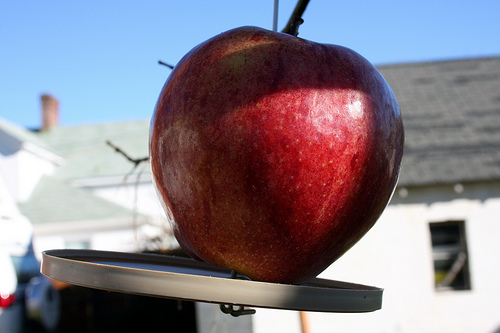
An apple feeder for winter birds.
(*photo credit)
December 14, 2018 Become Friends with Wintering Birds
According to tradition, the current Halcyon Days refers to a legendary bird, identified with a kingfisher. This bird is thought to have a peaceful and calming influence on the sea at the time of the winter solstice -- during its brooding season in floating nests at sea. The calm season is like American "Indian Summer," or a short period before winter storms arrive in earnest.
The birds we see now all about remind us landlubbers. We cherish non-migratory birds willing to endure our winters; these have an encouraging effect on all of us permanent residents who must suffer the coming storms. Many colorful migratory species have moved to warmer climates, just as have the over-wintering Florida retirees. However, hardy permanent birds become our special companions, and their presence helps calm our nerves.
Someone asked me whether I know all the birds that are the permanent residents near my residence. No, but they do include jays, crows, hawks, cardinals, buzzards, wrens, owls, and some geese -- but there are undoubtedly more. Their darting about, their small twitters and tweaks, and their willingness just to remain and try to make it through the winter gives us hope we can survive as well. They are here and they delight us, if we only look out and notice them.
Today the official bird count by the Audubon Society folks starts, in order to ascertain the bird frequency in number and locations. There's a special methodology used by experienced bird counters. However, if you are a compulsive counter and birdwatcher, you are encouraged to engage in the bird count and with time becoming professional about it. I like to count hawks while speeding down the major roadways, but this practice can be dangerously distracting if taken too seriously.
Some naturalists would argue that winter birds do fine on their own, even though their pickings are far more sparse than in summer. I have noted that the holly tree with its red berries outside the window is suddenly attacked by a flock of birds in mid-winter, and they consume all the fruit in a short time. The same phenomenon is noted on the neighbor's persimmon tree, where the ripe fruit are consumed by another flock of blackbirds in a matter of minutes as well. Wintering birds seem to like feasting together, maybe a form of communal action worthy of imitation.
Perhaps the current assaults on the environment require a certain flexibility on our part; we need to feed birds simply to keep our permanent friends sound and healthy through the winter months. Yes, a bird-feeding program is a good thing.
Prayer: Lord, help us show compassion for birds, for they becalm us, make us feel secure and allow us to be more sensitive to all creation, especially the more vulnerable flora and fauna. Inspire us to share our bounty with wildlife.

Coralberry, Symphoricarpos orbiculatus.
(*photo credit)
December 15, 2018 Remember FDR and a Second Bill of Rights
On Bill of Rights Day we ought to see that the original ten amendments to our U.S. Constitution were inserted with enough space to permit further additions. Human rights are not to be shaved down or eliminated, but rather expanded to include other rights not fully considered in the past. We are called to protect vigilantly the enunciated rights put forth by the Constitution's framers and observe and proclaim others as awareness and responsibilities grow.
Martin Moore in Capitalism: A Love Story concludes with a talk by President Franklin D. Roosevelt, who called for a second Bill of Rights to include such things as the right to a job and proper health care. The thoughts FDR presented near the end of his life have been accepted by other nations and became part of their social fabric, but not that of this country in its crass individualism. The challenge before us on this Bill of Rights Day is to expand rights to all people, not privileges to a chosen few.
Rights related to the sacredness of the human person:
* to life
* to free speech
* to freedom of the press
* to the redress of crimes and offenses
* to freedom of religion and ways of life
* to sexual orientation practices
Rights related to basic necessities and global commons:
* To clean air
* To potable water
* To nutritious food
* To clothing for warmth and decent appearance
* To shelter for security, protection from the elements
without fear of foreclosure
* To fuel for cooking and warmth
Rights related to a citizen's quality of life:
* To a job and to have meaningful employment
* To literacy and freedom to transact business
* To health facilities and protection
* To fair taxes and clean government
* to the chance to vote and to help determine government
* To mobility in traveling freely from place to place
* To proper police protection
* To jury by peers
* To Internet and global communications
(Finland has made fast Internet a right)
* To access to cultural heritages
Prayer: Give us the courage, Lord, to expose and defend our basic rights, and to curb the privileges that strive to limit these rights. Help us to impress on others the duties that come with acknowledgment of these rights and ensuring enforcement.

A Kentucky creek in winter colors.
(*photo credit)
December 16, 2018 Rejoice in the Lord Always.
(Phil. 4:4)
In mid-Advent we anticipate the joy of Christmas on this Gaudete (joyful) Sunday; we know with certainty that Jesus has already come; we now await his Second Coming with eagerness. Paul encourages us to fill our thanksgiving with the joy of the Christ who is with us. Zephaniah says that we are to shout with joy and to be glad and exult with all our hearts (Zeph. 3:14-18). Our sorrows and troubles are only temporary, and it is joy that fills our hearts at all times and gives us a hint as to how we are to conduct ourselves in this passing world. We need to...
* be always joyful, for our salvation is at hand and we have Christ present with us. Long-term sadness has no place in our lives;
* never cease praying, for we have so much to be thankful for in our world;
* striving to heal others, for then we can imitate the Christ who came here to heal the brokenhearted; and
* hear the words of John the Baptist, "Whoever has two cloaks should share with the person who has none. And whoever has food should do likewise." (Luke 3:10-18)
At the Seattle Special Olympics, nine contestants, all physically or mentally disabled, assembled at the starting line for the 100-yard dash. At the gun, they all started out, not exactly in a dash, but with a relish to run the race to the finish and win. But one little boy stumbled on the asphalt, tumbled over a couple of times, and began to cry. The other eight heard the boy cry. They slowed down and looked back. Then they all turned around and went back...every one of them. One girl with Down's syndrome bent down and kissed him and said, "This will make it better." Then all nine linked arms and walked together to the finish line.
Everyone in the stadium stood, the cheering went on for several minutes. People who were there are still telling the story! Why? Because deep down we know that what matters in this life is more than winning for ourselves. What matters in this life is helping others win, even if it means slowing down and changing our course. (Email from Betty Henschen to Dick & Martha Lammers and shared at Christmas, 2005.)
What is amazing about this brief story is that it is an example of people who run with joy, pray through their playful activity, are acutely attentive to the needs of others, and who share their radical giving by walking arm-in-arm with those who are the most vulnerable. Rejoice, for here is an instance where those of sincere heart are able to teach the rest of us who strive to live in a wounded and overly competitive world.
Prayer: Lord, help us to express our joy in public ways, to help it spread to others, and to make it contagious though work we share with our neighbors.

Faint sunlight in snowstorm. Woodford Cp., KY.
(*photo credit)
December 17, 2018 Fly on Wright Brothers Day?
Throughout the twentieth century many of us thought riding in an airplane was the thing to do. However the second century of aviation brought in a number of factors that has taken glamour out of this adventure, namely: standing in line, searches and shoe removal at airport inspection points; congestion and the flow of humanity boarding and deplaning; noise on approaching and leaving aircraft ticket counter encounters; airline delays and flight changes; cramped seating arrangements and the next passenger using a cell phone and taking up your space, and on and on. Airports take up immense amounts of urban land; parking is hard to find and sometimes we forget where the car is parked. Furthermore, planes can carry sick people and help spread a plague. Glamorous?
However, amid the inconveniences we get to places faster through using the airplane. Flying is more than exciting and exhilarating. For the long distance traveler, flying beats other forms of travel such as the stage coach and the sailing ships of yesteryear. The flying experience itself can be a welcome moment in our lives such as looking out the window as the landscape below flows past is a way of disconnecting with the concerns of everyday life. Upon arrival and stepping of the plane we pause for a moment of rare thanks that we had no mishap.
We know many good things about flying: mercy flights with humanitarian relief, the Berlin Airlift, search missions after human-made and natural disaster, and rapid travel for business or emergencies. Consider the marvelous work of helicopters, which can pluck stranded people off rooftops in floods or rush them to hospitals from remote places. For better or worse, we like flying.
Counterpoise those benefits just mentioned with the horror of a screaming fighter plane strafing innocent refugees in the Second World War. Think of the bomber carrying the atomic bomb over Nagasaki or Hiroshima, or the terrorist commandeering a passenger plane and sending it into the Twin Towers with many innocent people aboard. Think about the crop duster killing mosquitoes or the one adding chemicals to the food crops and harming farm workers. What about the considerable fuel costs and air pollution involved in air travel? Faster ground transport could replace half of those flights and even get people closer to their destination with ease. Think of the time it takes to get to an airport, park, pass through inspection, wait, board, fly, disembark, and take the local trip to the destination. However, getting across the ocean more quickly has many advantages. Maybe flying is a good thing when done moderately, infrequently and with respect for all parties.
Prayer: Lord, teach us to recognize that the Wright brothers ushered in a technology that went far beyond their wildest dreams. Show us our duty to ensure that this rapid mode of transportation is used properly and adds to the wellbeing of our Earth; help us to discern when to fly and when to use ground means or handle business through another more economic and resourceful mode.
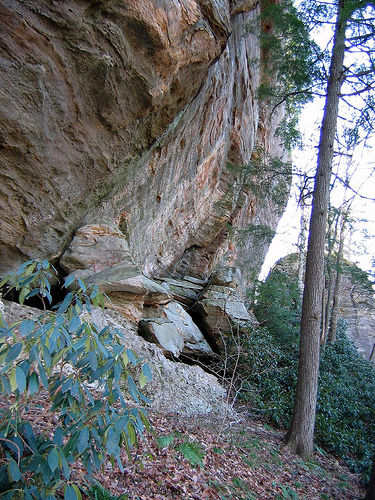
Point of contact: Sandstone over Limestone at Cascade Caverns, KY.
(*photo credit)
December 18, 2018 Profess Our Creed through Deed
The Word became flesh -- an unfolding deed in our midst. We in turn, are willing to do something (a deed) through our professing of word (a creed). Christmas is the story of the Word entering in a special way into human history. This is the time when we solemnly profess that we are to help make history in what we do in the service of the Lord. Our faith journey includes the history of our worshipping forbearers, who helped bring us into the world and nurtured our faith. Let's bear Christ to others by transforming inspired word into meaningful deed. In turn, by reflecting on accomplished deed, we can spread the Good News.
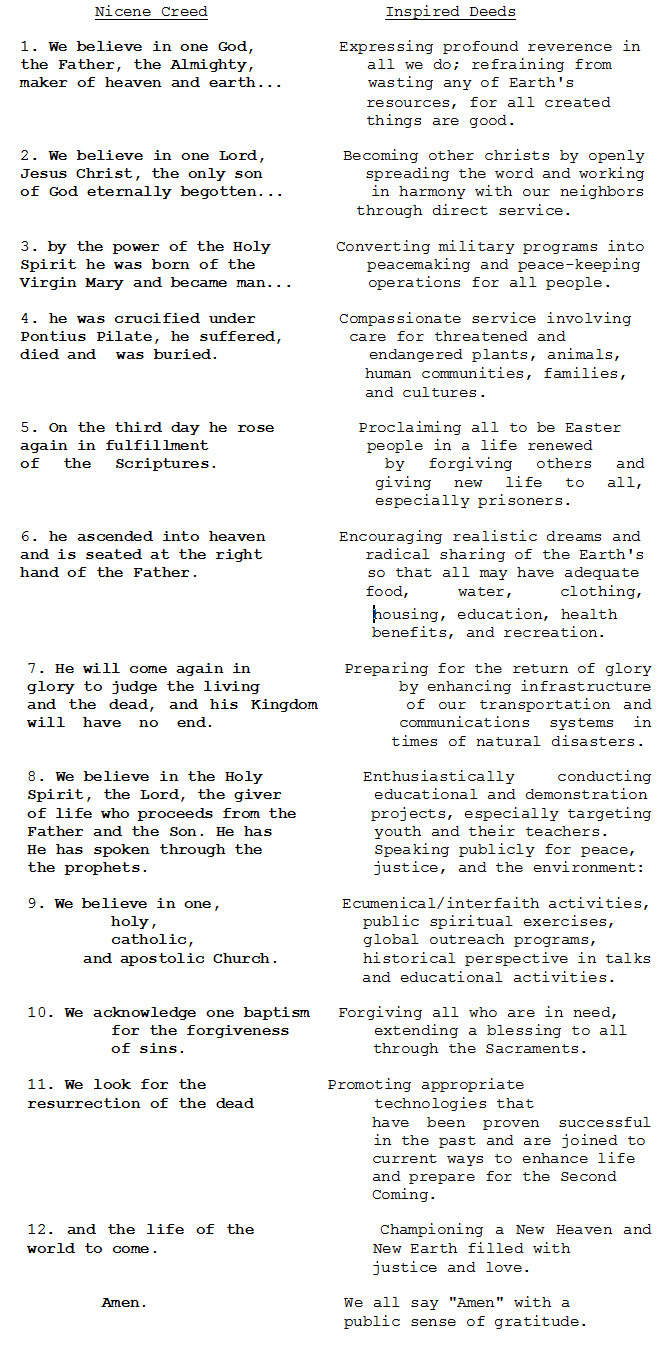

Northern cardinal, Cardinalis cardinalis.
(*photo by Sally Ramsdell)
December 19, 2018 Show that the Death Penalty is Not Pro-life
It always mystified me that some who pride themselves on being "Pro-life" would still desire that criminals face capital punishment. It is far more holistic to respect the life of ALL human beings, whether in the womb or beyond, whether in the cancer ward or on death row. Furthermore this respect should extend to other creatures (flora and fauna) of the Earth as well. We do not destroy animals for the fun of it, even if in some cases animal life must be sacrificed so that we can stay alive. We respect all of the precious creatures striving to live out their days.
Some who call themselves pro-life limit the extent of "pro" and seem to dehumanize certain criminals; these so-called pro- lifers overlook the life of a prisoner on death row but will defend the sacred status of human fetus. This inconsistency greatly weakens the pro-life stance. Whereas at least half of Americans would say they are in the pro-life camp, only a portion of that population desires to abolish the death penalty -- though numbers are certainly growing. However, in all fairness, more and more would not desire to observe cruelties that past generations may have thought enticing (hanging, drawing and quartering, beheading and crucifixion); these forms of capital punishment are no longer accepted means of putting people to death.
The death penalty has been abolished in half the nations, including the more civilized countries -- in Latin America, Great Britain, Australia, New Zealand, Canada, South Africa, France, Germany, Italy, and Denmark. The first countries to abolish the death penalty were Venezuela (1863), San Marino (1865) and Costa Rico (1877). An increasing number of countries will not even extradite a criminal to the United States, if there is a chance the trial would result in the death penalty. At least nineteen U.S. states have now abolished the death penalty: Alaska, Connecticut, Delaware, Hawaii, Illinois, Iowa, Maine, Maryland, Massachusetts, Michigan, Minnesota, New Jersey, New Mexico, New York, North Dakota, Rhode Island, Vermont, West Virginia and Wisconsin. Four have gubernatorial moratoria: Colorado, Oregon, Pennsylvania, and Washington. Furthermore, more and more American citizens see the death penalty as inconsistent with the enlightened age in which we live. Statistics show that the upkeep of those on death row is very expensive.
Executing an innocent person is utter tragedy. After investigation using modern DNA testing methods, a number of prisoners on death row have been proven innocent. Why not give all criminals the life-giving opportunity to make restitution? What a horror is to discover families of victims who delight in observing the particular criminal's execution. It is double victimhood! The prisoners' restitution and opportunity to repay society in some way are far more humane and pro-life.
Prayer: Lord, teach us to see life as precious in all aspects, and to champion offering additional life to those condemned to die.
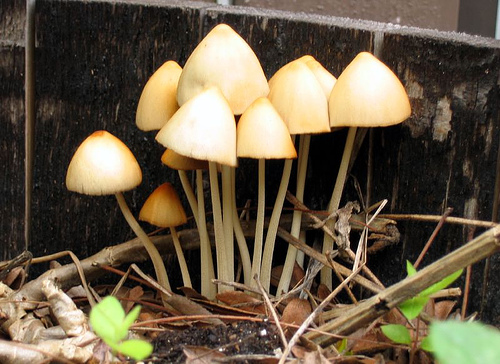
A cluster of unidentified garden fungi.
(*photo credit)
December 20, 2018 Appreciate Sacajawea Day
Sacajawea, the Native American woman who accompanied the Lewis and Clark expedition in the early 19th century, died 206 years ago today. She is a strong candidate for America's most unappreciated person; she carried and bore her child and nursed the infant while traveling in the harshest of conditions within the expedition; she connected with other Native Americans in the vast lands traversed and acted as translator; and she became the valuable intermediary and guide for the historic expedition that tied our nation from coast to coast. Without her the project would have failed. However, she was simply dismissed at the end of the expedition with little fanfare and virtually no compensation for the work performed. Yes, we now have a dollar coin that bears her image, but it is a little late, isn't it?
As this Christmas season approaches, it is fitting to probe our memories, experiences and records for unappreciated people in our lives and within our local communities. Many people do valuable services for which they receive little or no compensation; they are taken for granted, and sort of overlooked for those who boldly step out in front and take credit for things they did not do alone. The overlooked certainly should not be simply dismissed; they do not come to mind quickly, because we all are inclined to overlook them. It's hard to furnish a name because by definition they are the unappreciated; these rise from this category upon being recognized by the general public for what they did or do.
We need to be sensitive to all who contribute to society. They are the ones stop traffic for school children, pick up litter off the street, are quiet caregivers to loved ones; they run errands for the shut-ins; they cook and sell tickets and wait on us without us even looking up to see their faces. It is time we look up, let our eyes meet theirs, nod a gesture of gratitude, and add a kind word. This sensitivity or lack of it is highly tied to our concepts of privilege, namely, that we deserve the services of others, for we are paying for them. However, in the long run we do not deserve their blessings. Appreciation goes hand-in-hand with gratitude; when we become more thankful for gifts received, we begin to notice the persons who deliver these gifts to us.
Much of this lack of appreciation results from our failure to slow down, to see others in our midst, and to take a moment to look around at the invisible people who are all about. Does it take their death to appreciate them? Or does it take the careful detail of history to discover a Sacajawea -- or for that matter the entire Native American culture -- of which she was an unappreciated part? We tend to translate history into the feats of the mighty and the strong, and to forget that it takes many, including the forgotten supporters to give history its true meaning. Appreciating history then includes giving recognition to followers as well as leaders.
Prayer: The Lord is coming; let us appreciate this event and show our gratitude by saying "thanks" a little more often.
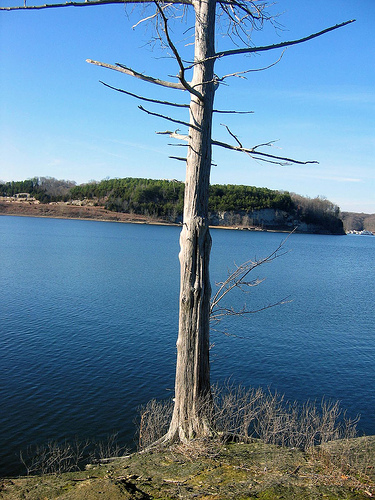
Green River Lake State Park, KY.
(*photo credit)
December 21, 2018 Welcome the Winter Solstice
In the northern hemisphere the winter solstice is the darkest day of the year (very dark at the North Pole and Arctic regions). Those of us who prefer not to drive at night find that it takes extra planning to travel in a shortened window of daylight. Day people have to search hard for benefits of this short light period. Actually the natural world needs a certain amount of darkness for chemical reactions, decomposition, nocturnal activity, and rest.
Darkness is not something to be fearful about, since we know that although it is of fifteen hours daily duration, it has bottomed out -- something primitives of old were fearful may not happen. Rather for the next half of a year, light will increase. Yes, the rest of winter lies ahead of us -- but at least from now on each day will get a little longer. Furthermore, this winter is the season of root growth and the stirring of new life, which is fully expressed in the coming springtime.
Darkness is dispelled through light, whether the light of the sun and heavenly bodies or through fire and artificial lighting. Decorative candles are encouraged provided they are placed away from combustible materials and attended to during a given festive period. Throughout the winter and early spring we return to festivities of light -- Christmas, Hanukkah, Kwanzaa, Candlemas, and Holy Saturday to name but a few. On these festive occasions we tend to light a single candle rather than to curse the darkness. We appreciate the power of light to guide us and to dispel darkness; we are attracted to enlightened people.
When a person in hospice care passes from this world, the Appalachian people speak of "going to the light" as a sign of new hope and life. We are more like moths than we care to imagine; we are drawn to the light in our total physical/spiritual being. All of us need light in order to remain healthy in both mind and body. During this darkened season some people tend to lose direction and actually need additional full-spectrum sunlight in order for the needed enzymes (and Vitamin D as well) to flourish. Their physicians even advise them to obtain and use a full-spectrum lamp for upwards of an hour or more a day.
Darkness is often equated with ignorance, the condition of the unenlightened. Through light we receive "insight," and thus can find a clear interior pathway to solving problems. Furthermore, the long winter as a time to focus attention and reflect. It is a time for personal and community enlightenment. The winter Solstice should not be a period of dread or foreboding; rather it can become a time of opportunity, a time when we reaffirm our faith that the days will get longer, that we can endure the darkness, and that a Light of the World stands at the end of the tunnel. Spring will spring anew, and winter is its introduction.
Prayer: Lord, allow us to see this season as an opportunity to grow in the light of grace and promising enlightenment.
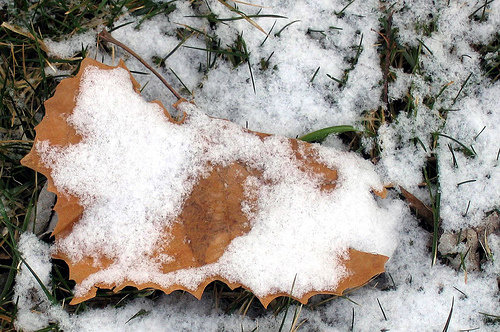
Snow-covered leaf of American sycamore, Platanus occidentalis.
(*photo credit)
December 22, 2018 Do Something Special at Christmas
God gives a special gift to us at this time, Christ himself. In turn, we must give something special to make this a truly sacred period. Some suggestions of which one may be practiced include:
* Special attention -- See to it that those who are foreigners or newcomers take part in American Christmas festivities.
* Special words -- Express gratitude for gifts given in prayerful thanksgiving to God, in attention to those who do the ordinary services that are taken for granted, and through talks, conversations, homilies and friendly greetings.
* Special feed -- Treat your pets or nearby wildlife to something special to express the expanded community of all beings.
* Special visit -- Give a special visit to those in hospitals, prisons, or senior citizen places during this holiday. Assist in delivery of gifts to those who are often forgotten.
* Special events -- Try your hand and voice at caroling, or encourage others to do so. In many respects this is one of the best ways to enhance the Christmas spirit.
* Special help -- Volunteer to take someone to Christmas Liturgy or other celebrations. Going yourself is one thing; taking one who generally cannot or will not go is another.
* Special rest period -- Be kind to yourself and refrain from extra travel; get enough rest in preparation for the holidays.
* Special foods -- Make a change of menu and eating habits. Today is the day to cook or treat others to a special type of meal that you have not experienced during the year. Is it to be Thai or Armenian or Alsatian or something else?
* Special service -- Visit those who cannot have a family Christmas, or will miss a recently departed loved one.
* Special reading -- Find an environmental essay and read it carefully -- and resolve to help do something about it.
* Special reuse -- Recycle one of last year's gifts to another person; it may be your favorite gadget or ornamental object, and that gives the gift special meaning.
* Special connection -- Look over the mailing list and make a personal call to someone you overlooked this past year. Make it a special Christmas treat.
Prayer: Lord, help us to be of special service to others and to see this as a way to give all we meet a deeper spiritual meaning of the Christmas holidays.

Christmas fern, Polystichum acrostichoides, native Kentucky plant.
(*photo credit)
December 23, 2018 Blessed Are You Among Women
Women are usually the last to benefit from increasing income [but] they are usually the first to make sacrifices when the financial situation deteriorates. The UN Standing Committee on Nutrition, 2009.
As we approach Christmas, we should remember that one mother had a key role to play in the sacred event we are about to celebrate. God enters into our history in a special way through the womb of a humble virgin, who becomes the God bearer, Theotokos. The days before Christmas are a special time for us to reflect upon the conditions necessary for successful birthing, and how adequate resources must be made available so that these births in this season can proceed in a safe manner. Globally, infant mortality rates dropped from 64.8 deaths per 1,000 live births in 1990 to 30.5 deaths per 1,000 live births in 2016 (8.8 million death down to 4.2 million annually). The highest nations are Angola with 96/1,000 and Central African Republic with 92). Today, there are still fifty million anemic expectant mothers and a billion undernourished women and children.
These sobering facts make us reach out and give a special blessing to expectant mothers, and rightly so. Social justice demands that we do so and still more. Part of this blessing is to help provide the care that is needed for a successful birth. Mothers' proper care and nutrition, as well as their sense of hope in the expectant child's future, have a social dimension just as Mary's motherhood was a cosmic event two millennia ago. Successful birthing by all women adds to the health of our Earth herself. We need a gentle mother's touch to keep this world on an even keel; we need to see a mother's act of giving birth as a social event, a bringing a new member of our human family into the fullness of a safe home situation. Thus motherhood is more than individual events; it has a social dimension involving us all: the mother's health and well-being in child-bearing carries over to the total upbringing of the child as a member of the world community.
Mary's unique womanly role is something only women can play. Perhaps within Mary's affirmation to be a mother is the unique gender role that brings about the healing of our wounded Earth. Mary's motherhood is her partaking of a divine gift given to females. Mary gives birth to Jesus. All women enter into this nurturing act, and the child-bearing role of birth of Christians, women and men, is more clearly manifested. Truly, not all women are mothers, but all women have the potential to be mothers and share in that virtual power to give birth to a better world -- to be Earthhealers. The mission to heal and bring new life is share in many ways with both women and men, and allows us all to see that Mary's consent and blessings radiates out this Christmas season.
Prayer: Lord, help us to prepare for Christmas in a very special way, to see that mothers everywhere have the health and safety needed to bring their offspring to full term.

Blue jay in winter, Cyanocitta cristata.
(*photo by Sally Ramsdell)
December 24, 2018 Twas the Day before Christmas... and Panic
Yes, it's just before Christmas and all through the house... panic is all about. There are gifts to purchase and wrapping paper and extra food and fuel for the vehicle and ... much to do on this last and most important shopping day before Christmas. Panic is not allayed by encouraging one to write a poem or a witty essay; that time has long passed. Nor can one bake cookies, make candy, construct a fancy birdhouse, or do a million other things dreamed up as pre-Christmas prep. However, here are some shopper hints:
If you must shop, either go digital or do it second-hand for good reasons --
* Secondhand places are not as crowded as are the Walmarts and the other markets of tacky new things fresh from China;
* Secondhand items are most likely made in America and of high quality;
* Without a pushing crowd there may be extra precious moments to decide exactly how this or that gift fits the needs and temperament of the recipient;
* It is ecologically more responsible not to drain more resources required to manufacture a useless gadget from scratch;
* It feels good not to give extra profits to billionaires, but rather help keep a modest-income shopkeeper alive and well;
* It allows one to shop without too much shoppers' guilt, something that can destroy the spiritual nature of Christmas;
* It relieves the stress of getting an expensive item home and wrapped without breaking it; and
* It is inexpensive, but includes the content of love so needed in this season.
If you decide not to shop, it is all the better to --
* Give a sum to charity in honor of the recipient;
* Look for some of last year's gifts that are unused and worthy of being recycled (not back to the giver please);
* Ask neighbors whether they have secondhand items that are worthy of being Christmas gifts;
* Wrap and give the book that you enjoyed most this past year, and realize that as gift a little part of you is transferred;
* Consider some creative gift wrapping;
* Prepare cards and tell your friends you will pray for them;
* Just call and chat awhile and say that you want to donate money saved from gifts to that favorite charity;
* Take a break and get a nap, for the rest will do you more good than burning the fuel in going to the secondhand store;
* Cook up an extra dish and give to a friend who hates to cook;
* And for heaven’s sake don't panic for the best is yet to come of Christmas Day, Christ himself.
Prayer: Lord, quiet my nerves and allow me a peaceful moment that will do so much more than busy work. Help me refrain from expensive gifts that can become materialistic distractions from the true meaning of Christmas.
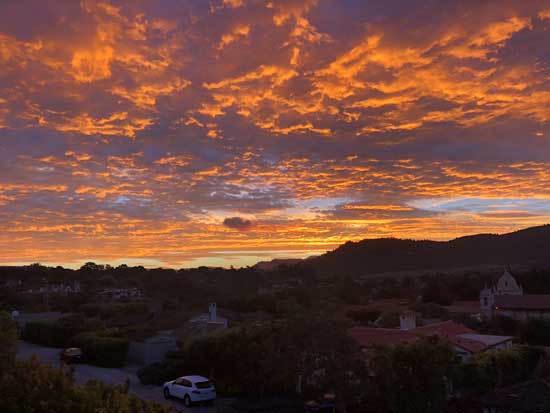
Sunrise view of Carmel Mission, Monterey, CA.
(*photo by Frank Fritsch)
December 25, 2018 Live the Magnificat
Magnificat
Our souls proclaim God's greatness as we say today
a bang, a cosmic flash, a universe in ageless delay,
comes in a moment, Christ-laden in a sublime and quiet way,
to one who partakes in a divine and human play.
Tis a simple maiden ready to say a sincere fiat,
and then give the world its grand magnificat.
Certainly blessed is she and also we,
but still in such a lesser degree
than she, in the words of writer Charles Peguy
"To her who is all faith and all charity
For she is also all HOPE," the world's light,
womb-hidden, now translucent to our delight.
Some try to shout aloud, proud and haughty in places sky high
inflated by their roles amid the hawker's cry.
Note their making, breaking profit-laden try,
even buy rules that announce that "nothing goes awry."
They will come down, either a miracle making things aright
or by our God-granting, temple-cleansing new-found might.
Bringing low the high by divine stroke, perhaps not so;
The anawim must be lifted up for all to know
and discover our God in utter gratuity, not false show,
even while tempted to seize what is rightly ours to bestow.
However, it's not ours to grab, nor the rich to give,
rather in mercy's freedom we come to share and live.
But how can this sharing be, if some refuse to yield
property, not theirs entirely but a commons field?
Here magnificat gives us its plan unsealed,
only by lowly work can a world be healed.
We, like Mary, utter a new fiat and are Christ bearers
taxing, prodding, forcing wayward wayfarers.
Painted red unfairly, instead, covered in her mantel blue,
Easter people find the risen Lord's power breaking through.
Revolution, dawning when a restless Spirit blew
a Pentecost of hope on many, not a privileged few.
Converging in a global glue, not chosen words the only key,
but God-given mercy shown by us in deed. Indeed, let it be.
Peace and Blessings this Christmas, Al F.
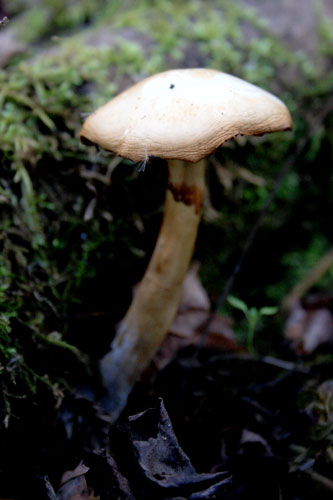
Patch of color on winter forest floor.
(*photo credit)
December 26, 2018 Confirm Our Down-to-Earth Spirituality
Christ comes down and in his humility is truly "down-to-earth;" he comes among us as the Prince of Peace; he is in our midst in our troubled Earth. When we come and enter the infancy "crib" scene, we see a cluster of shepherds and animals with the Holy Family; we experience a moment of light and comfort and joy -- a sacred time; we feel the warmth of light and heavenly music -- a sacred place. The scene appears to be a chance gathering, a brief moment, an unexpected place, but it is far more. Yes, the shepherds would return to their watch; the infant would be scooped up and taken into exile; the place would soon be left behind.
However, here and now God enters the human community in a special way. This scene makes us a little more down-to-Earth in our struggles to become a community of believers, who share the joy of Christmas together; we know the Lord is with us. This is also an opportune time to come together realizing that both local and global problems make us a caring community through instant communications throughout the world. Being down-to-Earth includes being in community, aware of time and rooted in place.
Some creation-centered folks attempt to launch their spiritual journey out into the vast universe with its incomprehensible distances of light measured in tens or countless light years; out there we observe the tiny specks of twinkling stars, which ancients thought were lights in the dome of the heavens. Through scientific experts, the THEY, explain that the cosmic process took billions of years from the big bang unto now, the THEN, and that our world extends in a macrocosmic sea of unimaginable distances, the THERE.
On the other hand, Down-to-Earth Spirituality starts with the grandeur of God's creation that is just below my feet, that I touch with my hands, which I know from immediate experience. For me, our Earth is not as a speck in the void but the ground of my being. Earth's dust is my origin and this mortal body's destiny. Earth is the mother of us all, warm, living, a microcosm. Starting here allows me to find myself HERE where I am located, NOW at the present time, and through the WE, a believing community who support each other.
The whole universe shows the handiwork of and presence of the Creator (Psalm 24), not afar, but very near. A resonance binds us all together and our Creator, who admires all that is made and finds it good (Genesis 1:3). God's imprint is with us at this point, for Emmanuel is with us. Once when I was explaining this down-to-Earth approach of starting at the microcosmos, a devotee of a "Universe Story" with its macrocosmic emphasis asked whether I could explain the microcosm in the manner that others explain the macrocosmos. I declined because that is not really my way.
Prayer: Lord, help us to be near others who need support; help us to feel your presence in our midst through the vibrations that hold us together and urge us to radically share with others.
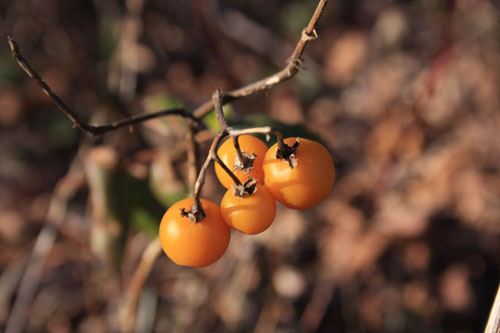
A cluster of Carolina Horsenettle fruits, Solanum carolinense.
(*photo credit)
December 27, 2018 Count Your 2018 Blessings
Our Christmas season includes many blessings that we take for granted and that people of two centuries back could have hardly dreamed about. Recounting these blessing is a blessing in itself:
* A lively faith that the Lord has come among us, and is to come again soon to establish a New Heaven and a New Earth, which we are to help bring about through our collective efforts as part of the Body of Christ;
* Good people in our past who have nurtured us, taught us, protected us, and built an infrastructure that give us quality of life;
* The ability to use our own bodily functions (seeing, hearing, thinking, etc.) to the degree needed for handling our daily operations and to be of service for others;
* A plentitude of nutritious food that can be stored safely, potable water, sufficient clothes, fresh air and all of life's basic essentials;
* Available medicines and measures to protect us from the illnesses that beset so many, along with health facilities and conscientious and devoted care givers;
* Accessible transportation to take us easily to distant places in all but the worst weather -- and at reasonably short time;
* Instant communication allowing us to speak on the phone to distant relatives and friends, and to send them rapid messages via the Internet;
* Warm lodging that protects us from the harsh elements, and can be heated without an enormous expenditure of time and effort provided we practice good conservation;
* Adequate education and literacy to know the basics of language and to negotiate the demands of modern life and the needs of active citizenship and commercial business;
* Freedom of religion to celebrate the sacred events of this time and place without fear of persecution, along with public professing our practices without interference from the state or those seeking correct thought and speech at all times;
* Basic security from police and fire departments that is not perfect but does permit most of us to rest securely at night and without fear of major disruptions in our normal lives;
* Friends and relatives who give and receive support, and service personnel who risk being in harm’s way for us, and are willing to come out when we are in need and ask their assistance;
* Wholesome entertainment that can keep us contented during this holiday season (through social media or performance in the outside world); and
* The Many things we have forgotten because of our fading memories or the everyday distractions that keep us from focusing on the elements of genuine gratitude.
Prayer: God, Giver of all good gifts, we thank you for blessing us during 2018 in many ways. Help us extend this sense of gratitude to all our relatives, friends and neighbors.
Global Collaboration Is Utterly Necessary
And for the support of this Declaration, with a firm reliance on the protection of divine Providence, we mutually pledge to each other our Lives, our Fortunes and our sacred Honor.
Conclusion: Declaration of Independence
The words just quoted proclaim a commitment to obtaining and maintaining the goal of our country. Today, our efforts expand to include a pledge for a better world that includes ALL our lives, fortunes and sacred honor. To achieve this goal we must be willing to collaborate globally with others. The call is for joint action requiring a worldwide Internet to communicate and work through the problems before us. Along with functioning communication we must have the willingness to be planetary sons and daughters of liberty, just as the Declaration of Independence was among independent colonists wishing to work and join together. We now wish a closer world union just as the founders desired a union of states. Counter to this is the glaring act that the U.S. acts like an ultra-nationalist power, the only nation not participating in the Paris Climate Change Accord -- our own crime against humanity.
An emerging event. As we move to 2019 we must address the urgency at hand. We need to move our country to participate as was done during the 20th century. It is equally important to confront our unwillingness to address the crippling inequality of the current economic stance. We can never have a viable renewable economy unless the several shortages of our nation and its people are addressed. Our Environmental Protection Agency has been gutted and primary regulations voided or left unattended. Damages mount as time runs out to hold the world to a 1.5 degree Celsius climate change rise above the advent of the industrial age. The situation is even more serious than that facing our founding parents in 1776.
Tackle inequality now. Coming to greater equality in the 19th century demanded the abolition of slavery, a partly economic matter. As President Lincoln reminded us, this took over four score of years from the founding of the Republic -- and it involved a bloody Civil War. Currently, we are aware that the U.S. has been a very heavy contributor to the condition of our troubled planet. If willing we could help halt the disaster that is pending and could be ongoing for centuries. Our toleration of the power of the super-rich Big Energy merchants of doubt to spread discord is our undoing; we are partly to blame for this crime against humanity, namely neglecting to curb climate change which could affect the lives of billions. Hesitancy to join the world community is an impeachable offense.
Individual environmental actions are necessary for allowing a growth in personal responsibility and respect for all of God's creation. The individual is key, but he or she cannot act alone. Too many problems demand more than a series of individual actions for solution. This problem of climate change is profoundly social in nature; we crave effective government to bring about change. Our forebearers were aggrieved by distance and lack of concern by King George III; so today find distance from the White House in addressing global needs -- and we are aggrieved by our lack of domestic leadership. What should we do?
Basic resources exist. We have flourishing environmental groups who work hand-in-hand at a regional, national and global level and yet not with the current Administration. The elements for social change including Internet, effective sub-groups and a history of cooperation are all in place. Why the unwilling nature of this Administration? How can we free our nation and world from the clutches of billionaires and join the community of nations in this serious climate change situation?
Need to cooperate. The faltering global community does not have the wherewithal to effect changes that are desperately needed. The system is weakened in our absence. Furthermore, the entire body of nations suffers as did the Articles of Confederation with lack of effective powers to bring change. Partly it is a lack of collective resolve to confront the power of fossil fuel producers. All earnest citizens of our world hope for a better future, though the collaborative efforts are challenging. As an imperfect world community we are deeply harmed by food insecurity and lack of health accessibility. How do we handle and control excessive wealth as Americans, much less as a world in need of resource redistribution? Do we have the luxury of time to solve our inequality problems and reduce the power of the climate change deniers? Can we confront secular materialism and its allurements, which distract us from real global problems?
Spiritual calling. The formation of our Republic came through a majority of spiritually-driven delegates who prayed earnestly for success of their venture. The same drive for spiritual guidance and support is needed today at a global level; we need the help of Divine Providence, even if some change agents do not believe and lack unanimity. Believers in the Future must come forth and speak out on the need for total collaboration, and that starts here at home in the U.S. Breaking down lack of willingness to change takes prayer, but we must succeed even if we are few change agents.
My book Resonance (Amazon Books) was written to help begin a process to work for greater global harmony, so that the believers in the future have the space in which to collaborate as one body. It is more than it might hopefully succeed; rather it must succeed. Failure will prove catastrophic. Working in harmony is the very foundation of this success, even if a portion of the world does not go along. It takes faith in the company of believers that we can resonate together. We are charged with saving our planet; that is a most noble undertaking, with "noble" involving a total citizens' action.
Core believers are necessary. Change agents arise from the body of citizenry; they include people who are gifted at working together through familiar social media to effect change. An accord is needed ASAP, for time is running out on keeping the warming of our Earth to a minimum. We can change the world through God's help, not by acting alone. The world can be saved, but that takes a grand process of salvation, of which we are called to be co-workers. Are we willing and able to engage in the task before us? God only knows.
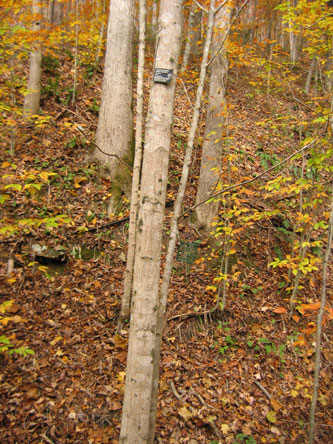
Tree labels at the Mary E. Fritsch Nature Center, Appalachia - Science in the Public Interest. Livingston, KY..
(*photo credit)
December 28, 2018 Remember to Pray for and with Children
Holy Innocents Day is a perfect time to consider the thousand children throughout the world who will die today from preventable diseases and malnutrition. They are part of an extended community of the newborn male babes who were killed by Herod in the environs of Bethlehem two millennia ago. The innocents of all ages whose lives were shortened by human malice or lack of sharing of resources were never able to reach their full potential of a long life and service to others. Little wonder that for centuries this feast was placed very close to Christmas and the Christ child.
Many people young and old in our busy secular world take no time to pray or those in tragic conditions. They may ask a more basic question "Do you pray?" somewhat embarrassing. They will admit the need for prayers, and even ask others to pray for them. They recognize the need for assistance from the Almighty, yet they regard more pressing things to do then to beg in prayer or to thank God for gifts given. Everyday private prayers are somewhat foreign until these people are caught in the ongoing news of deaths from terrorists, illnesses, auto accidents or examinations. When difficulties come close to home a prayer comes to mind -- perhaps.
If parents are part of this group of the infrequent "prayers," then what about their children? Are they being taught their morning and evening prayers -- the Our Father, the Hail Mary, the Sign of the Cross, Grace before Meals? While these are common prayers with set formulas, they become personal and familial through use over time. Adults and youth, who spend time praying together, stay together. Do youth see parents get down on their knees, or just sit quietly and pray at the start or finish of the day? Teaching a particular prayer is one thing; however, seeing another pray is a more powerful way of teaching the young the need to spend time with God. At public functions some youth know common prayers and some seem very embarrassed by their own ignorance. Let's pray that parents take the task upon themselves to pray for and with their children.
Teaching youth has added advantages for parents and guardians: the prayers of the young are powerful, and we grow in understanding this with time. The youthful prayer is often very sincere and this causes parents and others to give more attention to their own prayer time. Furthermore, parents realize that what is taught now is an investment for the future, for a habit of prayer can endure for someone's lifetime long after parent or teacher passes. All of us need God's help and yet we are sometimes remiss in connecting with the Almighty. A few can be seen praying at shrines or at restaurants before a meal, or using prayer rugs at rest stops. Let us all learn from those who pray in public; hopefully they may teach us all to pray. This is something for all, young and old; we are encouraged to join in praying at year's end.
Prayer: Lord, inspire us to teach the young to pray, for their prayers are powerful, and their manner worth imitating.

A young pup enjoys a "stolen" butter cup.
(*photo credit)
December 29, 2018 Have Soup on Winter Days
Some of us may not like soup six months from now in warm weather, but it sure tastes good at this time of year. This choice can also involve much creativity, for we can change a basic soup of the week into a new daily creation by varying added vegetables and spices. Why be slaves to recipes? Create your own soup of the day and be proud of it (see this website for 365 new soups). Many soups can be simple modifications of standard soups, but they do represent a series of culinary and tasteful delights on a slim budget. Treat cooking like jazz improvising: the possible music is edible leftovers; turn them into the changing soup of the week.
Winter has few other rewards as great as hot soup. The original concept of soup-making must have been food conservation, namely, saving all the cooking juices and leftovers and putting them together into another meal. A creative cook can change the taste of soup in endless ways because of the variety of basic ingredients and spices that can be mixed in. However, traditional soups such as split pea soup come out the same way week after week unless -- we change the nature of it by adding spices, veggies, herbs, meats, bouillon or combinations to create a new essence of soup. Why keep slavishly to the old recipes?
Traditional pea soup attracts a certain group of people, namely the ones who like the same things over and over. These traditionalists have their place in the world, but it truly takes rigidity to keep to traditions and reject the philosophy of a new soup every day. "Split pea people" like operas sung a certain way, Thanksgiving meals with certain courses in a proper order, Sacred Liturgy performed exactly the same way with homilies of the same words said again and again. For these folks, vacations involve going to the same places and indulging in the same entertainments as practiced year after year; they may complain if a commercial cook makes a soup in a new way. They express this with such words as, "Don't foist your creativity on me."
Soups invite creative variety in ways that meat, fish or single vegetable dishes do not. We accept the fact that they remain soup with great variation, with possible conservation of leftover food, and inviting new and different spices. Using our talents to vary our meals becomes an opportunity in a food- short world. Shake up those who see routine as their God-given right; rather, make each day a unique gift from our Creator. While cooking routines save time, they can become ruts that fast food giants capitalize upon; these promoters of "bland" want customers to order only a limited variety of hamburgers and fries. Yes, affluent consumers choose from a host of ethnic restaurants (Mexican, Chinese, Italian, Thai, etc.). However, ordinary folks can champion home variety. In fact, "burgoo people" of Kentucky insist on variety of ingredients, including an assortment of hunted varmints; pioneers believed in culinary adventure; so ought we.
Prayer: Creator Lord, make us creative in soup-making skills.
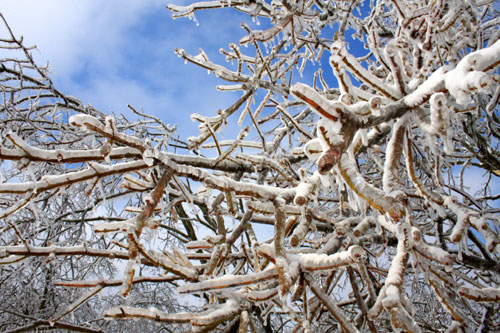
Ice and snow coating on winter trees.
(*photo credit)
December 30, 2018 Give Sacred Space to Youth
The Feast of the Holy Family is always challenging to us, especially to those of us who do not have the opportunity to raise offspring. What would I do if my pre-teen charge should suddenly disappear, an event that causes consternation in any family? We wonder what runs through the minds of Mary and Joseph when Jesus' absence is realized. This was something new, a beginning of an awareness that family life changes with time, and nestlings abandon the nest and take up their own lives. Every family learns that private space is demanded by all, even the most perfectly acting youngster. Over-protection and constant cell phone use is not good; youth also need silent space to find themselves.
Jesus is on his own psychological journey; he has always been obedient and is still an exuberant youth, able to move faster than kinfolks in that traveling group of old and young -- moving slowly from Jerusalem back to Nazareth. His parents lose contact with him, though he is confident that he can catch up after attending to "his Father's business" in the temple. Here is a youth breaking away, and what is most telling is that his parents become willing to accept this as part of his journey of life, his ongoing bar mitzvah. Anxiety is turned into joy, as Jesus rejoins them and goes back to Nazareth and becomes obedient to them; he advances in wisdom and age and favor. We realize that within the Church the parallel of the Gospel of Luke -- the Acts of the Apostles -- shows disciples forming new communities, each of which advances in age and wisdom and favor before God and fellow human beings.
All young people must be given the sacred space needed for finding their own chosen vocation -- and parents can only do so much. Unfortunately, with the great demands placed on people today, youth grow up too fast. Parents provide a variety of youthful needs and especially costly higher education; debts mount. Thus today the pressure is to conform to parental expectations and acquire a paying job in the best position possible and in the shortest time. Previous volunteer opportunities are at a premium.
In this brief window into Jesus' early life, Mary realizes that her family is not static but a dynamic reality. Jesus would move on, for he is on a mission. Mary ponders in her heart this event among others in a brief and hidden history of coming to adulthood. The Holy Family's qualities include compassion, kindness, humility, mutual forgiveness, obedience of children (Colossians 3:12-17). Compassion involves pondering in our hearts; kindness helps create healthy home environments; humility permeates all family relationships; mutual forgiveness heals old wounds and invites new life. Through obedience, Jesus submitted to Joseph and Mary -- and he grows in wisdom and age and grace into adulthood.
Prayer: Lord, help our families to imitate the Holy Family itself, and to have the courage to submit to your will and share in mutual respect for the needs of each other. Let all be patient to assist and support those who are growing into maturity.
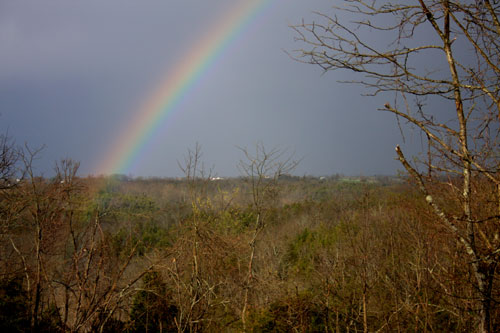
A rainbow to celebrate year's end.
(*photo credit)
December 31, 2018 Glance Back and Look Ahead
The last day of the year is like careful driving -- looking back in the rear mirror frequently and still keeping our eyes peeled ahead on the coming 2019. Past experience and future plans coalesce in making this a precious moment at year's end -- when we turn our minds to a combination of thanks for what has happened and petition for what lies ahead. Glancing back involves examination of where we came from; looking ahead calls for plans as to where we intend to go. Both are spiritual exercises; the past involves twists and turns and detours serving as guides, for we shape our past into a grand experience; the future is a horizon that is as bright as we are willing to help create it.
The past glance includes the good and the bad, the successes for which we are thankful and the failures for which we ask forgiveness. We cannot walk backwards for long, or else we stumble and fall again. God forgives, and thus we turn our face to the future. While glancing back for this moment, let's list all the achievements of the past year, the people served, the times of celebrations, the health and mobility and happiness we received. We may have to review our daybook or jog our memories. It may be interesting to see where we were in January and how much our plans and life have changed in twelve months. Are we the wiser for what has occurred? What about unexpected deaths, illnesses, stresses and other events? How much did we become concerned about the economic and political difficulties of our neighbors near and far?
Looking ahead involves a faith in a future that is to come, and a hope that all will go well. Some of us may ask a series of questions; others may practice a certain indifference that says, "let it come to be;" still others may find an uncertainty that can be stressful in itself. Believers expecting a future eternal life ahead, have a core perspective that colors how to approach the coming year. The eternal life is like a sun just behind the horizon, and its eventual rising is our hope that orients us and draws our attention. Our past directs us as a guide; our future inspires us as a dawn of new possibilities. With both of these we engage in the present moment, the NOW of our lives.
In an abbreviated format this could be more than a yearly exercise. Is it not best as 2018 runs out to spend some time today to review our year activities and remember how we adjusted to the time, the prompting of the Spirit, and our successes and failures. Again we seek forgiveness and also thank God for letting us live in these troubled times and to be of service. St. Ignatius Loyola regarded daily examinations as the most essential daily exercise. Consider this annual examination as a good preparation to resolve to institute daily ones 2019 so that we grow in oneness with the Lord.
Prayer: Lord God, we thank You for bringing us to this point. Forgive us for when we tripped and fell. Help us rise up with new vigor and eagerly take on the challenges of the coming year. |